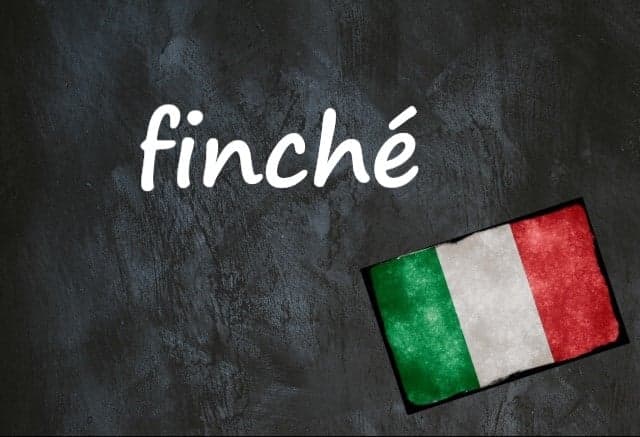Italian word of the day: 'Finché'

Hopefully it won't be long until you can use this tricky Italian word with ease.
Today's word is one that is commonly muddled up by Italian language students - but sometimes by native speakers, too.
Finché and finché non translate quite differently into English, but the two are so easy to confuse that even Italians themselves do it. And even more confusingly, sometimes that's ok.
So let's look more closely at how to use them both:
Finché (pronounced 'fin-keh') is often thought to mean “until”, when in fact it means “as long as” or “as much as”.
- Finché va bene a te.
- As long as it's ok with you
Instead, finché non means “until”
- Non mi interrompere finché non ho finito
- Don’t interrupt me until I have finished. (or literally “Don't interrupt me as long as I haven't finished.”
- Si lavorava finché il padrone non diceva "basta",
- We worked until the boss said, “that’s enough.” (Or literally: “we kept working as long as the boss had not said “that’s enough.”)
Probably because this construction feels so awkward to English speakers, students often accidentally miss out the non.
But that's not always wrong.
Sometimes you might also hear Italians use finché when you might think finché non would be grammatically correct.
Just as we do in English, Italian speakers abbreviate when speaking quickly and informally, using lots of contractions and missing out words. (In fact, the word finché itself is a contracted version of the phrase a fine che.)
You might hear something like:
- Possiamo continuare a fare le pizze finché finisce tutto l'impasto.
- We can keep making pizzas until all the dough has been used up. (or literally: as long as the dough isn't finished.)
So the meaning here is still clear.
That's because when the meaning of finché is “until the time that...”, the use of the negation ‘non’ is optional as the sentence should make sense without it.
But – attenzione - sometimes it's not optional and will change the meaning completely - like when the meaning of finché is "as long as".
Compare these two sentences and you'll see what I mean:
- Sono stato bene finché ho abitato a Milano
- I've been fine as long as I've been living in Milan.
- Sono stato bene finché non ho abitato a Milano
- I was fine until I lived in Milan.
As you can see, the little non can make a big difference.
With practice you'll eventually get the hang of the rule, and then you can - maybe - get away with breaking it yourself. As long as (finché?) your Italian teacher isn't listening.
Do you have a favourite Italian word you'd like us to feature? If so, please email us with your suggestion.
Comments (2)
See Also
Today's word is one that is commonly muddled up by Italian language students - but sometimes by native speakers, too.
Finché and finché non translate quite differently into English, but the two are so easy to confuse that even Italians themselves do it. And even more confusingly, sometimes that's ok.
So let's look more closely at how to use them both:
Finché (pronounced 'fin-keh') is often thought to mean “until”, when in fact it means “as long as” or “as much as”.
- Finché va bene a te.
- As long as it's ok with you
Instead, finché non means “until”
- Non mi interrompere finché non ho finito
- Don’t interrupt me until I have finished. (or literally “Don't interrupt me as long as I haven't finished.”
- Si lavorava finché il padrone non diceva "basta",
- We worked until the boss said, “that’s enough.” (Or literally: “we kept working as long as the boss had not said “that’s enough.”)
Probably because this construction feels so awkward to English speakers, students often accidentally miss out the non.
But that's not always wrong.
Sometimes you might also hear Italians use finché when you might think finché non would be grammatically correct.
Just as we do in English, Italian speakers abbreviate when speaking quickly and informally, using lots of contractions and missing out words. (In fact, the word finché itself is a contracted version of the phrase a fine che.)
You might hear something like:
- Possiamo continuare a fare le pizze finché finisce tutto l'impasto.
- We can keep making pizzas until all the dough has been used up. (or literally: as long as the dough isn't finished.)
So the meaning here is still clear.
That's because when the meaning of finché is “until the time that...”, the use of the negation ‘non’ is optional as the sentence should make sense without it.
But – attenzione - sometimes it's not optional and will change the meaning completely - like when the meaning of finché is "as long as".
Compare these two sentences and you'll see what I mean:
- Sono stato bene finché ho abitato a Milano
- I've been fine as long as I've been living in Milan.
- Sono stato bene finché non ho abitato a Milano
- I was fine until I lived in Milan.
As you can see, the little non can make a big difference.
With practice you'll eventually get the hang of the rule, and then you can - maybe - get away with breaking it yourself. As long as (finché?) your Italian teacher isn't listening.
Do you have a favourite Italian word you'd like us to feature? If so, please email us with your suggestion.

Join the conversation in our comments section below. Share your own views and experience and if you have a question or suggestion for our journalists then email us at [email protected].
Please keep comments civil, constructive and on topic – and make sure to read our terms of use before getting involved.
Please log in here to leave a comment.